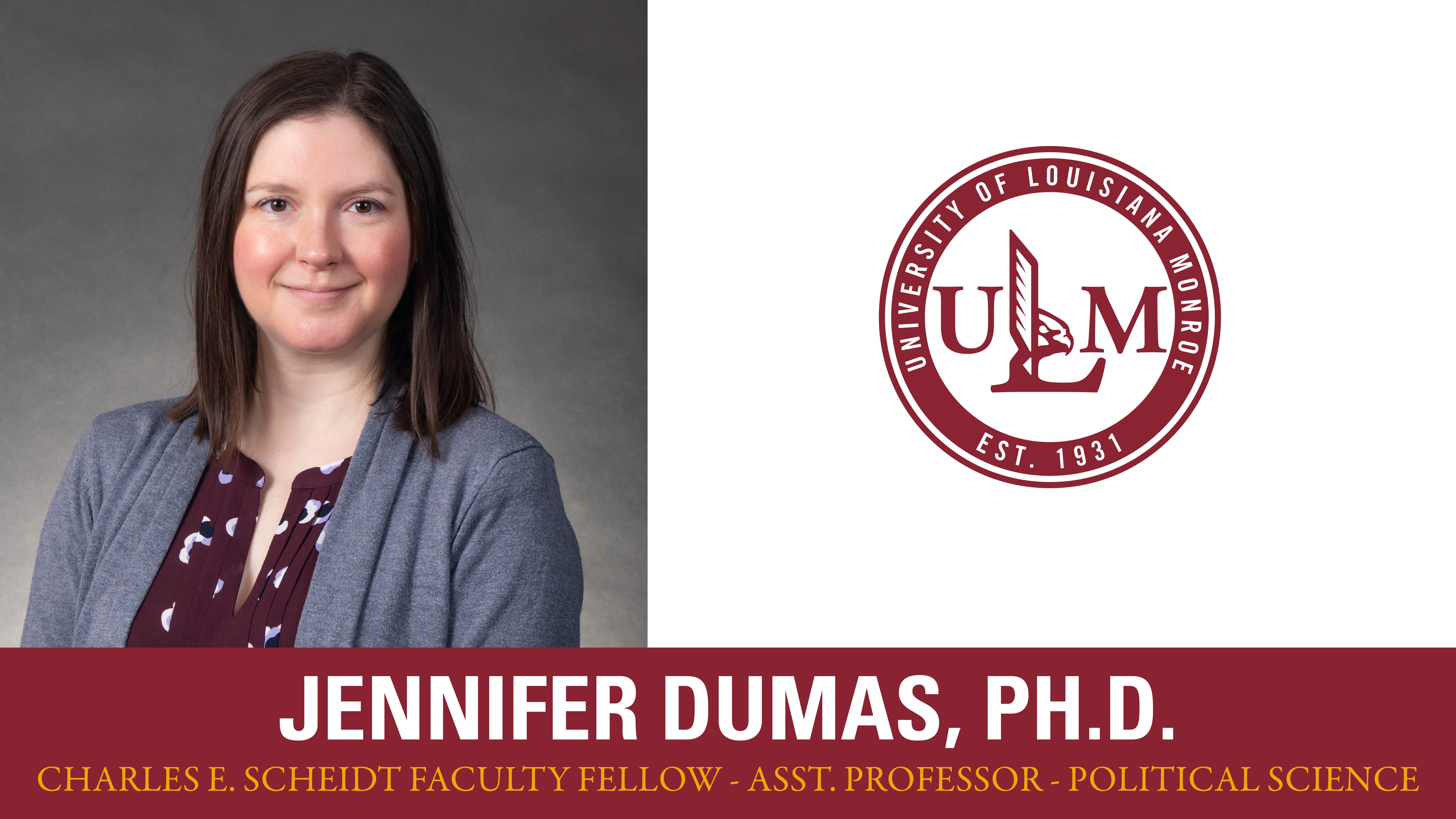

MONROE, LA– Jennifer Dumas, Ph.D., Assistant Professor of Political Science, has been named a member of the 2023-2024 cohort of the Charles E. Scheidt Faculty Fellows in Atrocity Prevention Program, sponsored by Binghamton University's Institute for Genocide and Mass Atrocity Prevention (I-GMAP).
The Faculty Fellows program, which includes 46 scholars from over 30 colleges and universities around the country, is dedicated to bringing together faculty members to review scholarship on mass atrocities, identity-based violence, and human rights, and discuss ways to incorporate this research on mass atrocity and genocide prevention efforts through innovative pedagogical efforts in their classrooms.
Faculty Fellows will hear directly from experts in the field, including I-GMAP's sister organization, the Auschwitz Institute for the Prevention of Genocide and Mass Atrocities (AIPG), a non-governmental organization operating worldwide to facilitate atrocity prevention.
The Faculty Fellows program is a multidisciplinary approach with faculty coming from a variety of programs, including Political Science, Theater, Business, Nursing and Computer Science, among others.
Fellows attend trainings, briefings and lectures on mass atrocities as well as prepare course syllabi that demonstrate integration of insights on violence prevention in the classroom. They receive a $2,500 reward and travel expenses to attend the 2024 Frontiers of Prevention international forum at Binghamton University in the spring upon completion of the program.
“I’m thankful for the opportunities provided by the Israel Institute and I-GMAP to expand course offerings for the Political Science program at ULM and enhance pedagogical approaches to my courses based on training in atrocity prevention,” Dr. Dumas said.
Dr. Dumas will utilize the Faculty Fellows program's resources in upcoming Political Science courses, including an African Politics course in the fall and a Senior Seminar course in the spring, focusing on religion and politics in modern Israel.
The latter course is supplemented by a $10,000 course development grant from the Israel Institute, awarded to U.S. and Canadian university faculty members who wish to develop undergraduate courses on Israel. The course will examine the unique role that Israel plays as the only Jewish state in the world and will look at the evolution of secular and religious Judaism in Israeli politics and governance, including the legislature, legal system and military, over the past 80 years, with special emphasis on changing relations among secular and non-secular Jewish Israelis, Ultra-Orthodox communities and Arab Israelis.
Students will receive a comprehensive introduction to the role of Zionism in the founding of the State of Israel, explanations regarding the role of religion in government turnover and conflict with the Palestinian territories and neighboring states, and finally, an assessment of the impact of changing religious demographics within Israel on domestic political coalitions, foreign policy shifts in the region and diaspora relations.
Dr. Dumas will undergo language training and visit relevant institutions and sites in Jerusalem to enhance her teaching of the course, including Givat Ram, to tour the Knesset and Supreme Court, as well as Yad Vashem (The World Holocaust Remembrance Center), the Western Wall and the al-Aqsa Mosque. The award money will further help fund a trip to New Orleans in the spring for students enrolled in the course, where they will visit the Museum of the Southern Jewish Experience and the World War II Museum.
At the Museum of the Southern Jewish Experience, students will learn of the timeline and motivations behind waves of Jewish immigration to the U.S. South as well as get a first-hand view of religious and cultural artifacts related to Judaism.
On their visit to the National World War II Museum, students will connect knowledge gleaned from the Museum of the Southern Jewish Experience's exhibits on U.S. Jews in the South during the Holocaust to the role of anti-Semitism in both World War II and the Holocaust as well as initial U.S. hesitancy to engage in the war before the bombing of Pearl Harbor.
This will provide context to the course's focus in the latter half of the semester on new developments in Israeli foreign policy, specifically on the evolution of the U.S.-Israel bilateral relationship in the context of shared and disparate religious discourse as opposed to regional geopolitical strategy.
“It is crucial that ULM students have the ability to learn about the history of mass atrocities around the world and consider ways they can practice violence prevention and protect human rights in their homes, communities and careers,” Dr. Dumas said. “I look forward to the ability to offer my students a hands-on learning experience through their museum visits in the spring.”